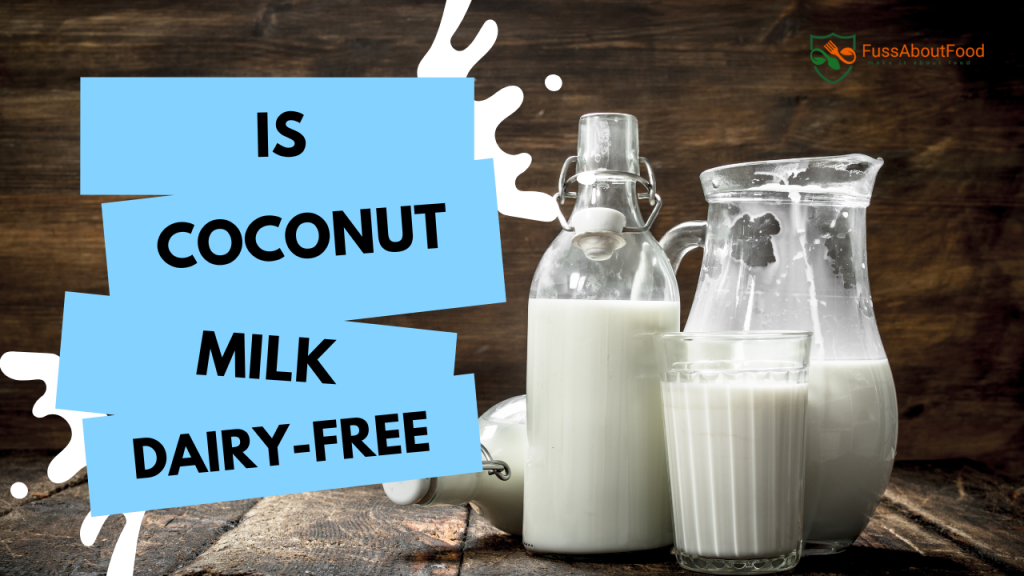
Coconut milk has become popular for those looking for a dairy-free alternative to traditional milk.
But what exactly is coconut milk, and why is it a go-to option for people avoiding dairy?
Let’s explore the details.
Table of Contents
What is Coconut Milk?
Coconut milk is a creamy liquid extracted from the grated meat of mature coconuts. It is widely used in cooking and baking and as a milk substitute for beverages. Unlike coconut water, the clear liquid found inside coconuts, coconut milk is made by blending the flesh with water, resulting in its rich and velvety texture.
There are two common forms:
- Canned Coconut Milk: Thick and used for cooking or making desserts.
- Carton Coconut Milk: Diluted, lighter, and used as a dairy substitute in coffee, smoothies, or cereal.
Must Read – Is Coconut Milk Gluten-Free
Is Coconut Milk Dairy-Free?
Yes, coconut milk is completely dairy-free. This means:
- It does not contain any lactose, casein, or other animal-derived ingredients.
- It’s an excellent option for people with lactose intolerance or those following a vegan or plant-based diet.
- It’s naturally gluten-free, soy-free, and nut-free, making it a suitable option for individuals with various dietary restrictions.
Why Choose Coconut Milk?
1. Great for Dairy-Free Lifestyles
Coconut milk provides a creamy, satisfying texture similar to dairy milk without the allergens.
2. Rich in Nutrients
- Contains healthy fats, particularly medium-chain triglycerides (MCTs), which provide quick energy and are easier to digest.
- Supplies small amounts of iron, magnesium, and potassium, contributing to overall health.
3. Culinary Versatility
- Adds a rich flavor to soups, curries, and desserts.
- Works well in dairy-free coffee, smoothies, and as a base for ice cream.
Considerations When Using Coconut Milk
Although coconut milk is nutritious, it’s best consumed in moderation:
- High in Calories: Especially the canned version, which is more concentrated.
- May Cause Allergies: Rarely, some individuals may be sensitive to coconuts.
Choose unsweetened, minimally processed coconut milk to avoid added sugars and preservatives.
Is Coconut Milk Good for Your Gut?
Coconut milk can benefit your gut health when consumed in moderation:
- Contains MCTs (Medium-Chain Triglycerides): These are easy-to-digest fats that may promote healthy gut bacteria.
- May Help Reduce Inflammation in the Gut: This can be especially helpful for individuals with irritable bowel syndrome (IBS).
- Low in Lactose: A great alternative for those sensitive to dairy.
Is Coconut Milk Anti-Inflammatory?
Yes, coconut milk has anti-inflammatory properties:
- Rich in lauric acid, which may help reduce inflammation in the body.
- Contains antioxidants that combat oxidative stress, a key contributor to inflammation.
How to Use Coconut Milk
Here are some ideas for incorporating coconut milk into your diet:
- Cooking: Use it in soups like Thai tom kha or as a base for creamy sauces.
- Baking: Substitute it for dairy milk in cakes, muffins, or puddings.
- Smoothies: Add it to fruit and greens for a creamy, dairy-free blend.
- Coffee or Tea: Use it as a dairy-free creamer alternative.
Final Thoughts
Coconut milk is an excellent dairy-free alternative for anyone looking to avoid lactose, adopt a plant-based diet, or simply try something new. Its creamy texture and versatility make it a valuable addition to a wide variety of dishes and beverages.
By choosing high-quality, unsweetened options, you can enjoy the many benefits of coconut milk without the added sugar or unnecessary additives.
Whether for cooking, drinking, or baking, coconut milk is a delicious and healthy choice that meets the needs of diverse dietary preferences.
